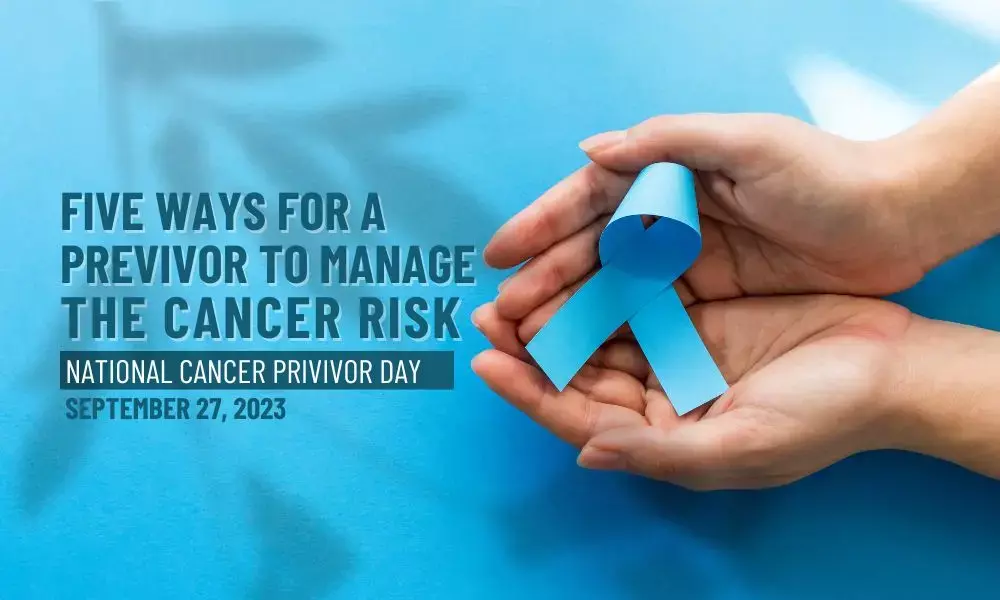Witnessing our loved ones being diagnosed with cancer and being there with them in their journey is overwhelming and alarming. A cancer case in the immediate bloodline can make an individual insecure about their life and health.
Table of Content
-
What is a Previvor?
-
Significance of National Previvor Day
-
Hereditary cancer Types
-
What can a Previvor do to reduce the risk?
What is a Previvor?
A previvor is an individual who has a high risk of being diagnosed with cancer due to a risk running through their family. A previvor may always have the mental burden of being diagnosed with cancer.
Previvors have a higher chance of developing cancer than others because of their DNA.
Significance of National Previvor Day
National Hereditary Cancer Week and National Previvor Day are important reminders of hereditary cancer’s impact on families. Approximately 13% of all cancers are hereditary. This year, National Hereditary Cancer Week is observed from September 24 to September 30, and National Previvor Day is September 27.
National Hereditary Cancer Week and National Previvor Day are times to spread awareness among people with a genetic mutation that may increase their cancer risk. One may not be able to eliminate the cancer risk, but the risk can be managed by taking some preventive measures.
Hereditary cancer Types
Hereditary or inherited cancer types are the ones that are caused by a mutation in the gene that was present in cells of the egg or sperm at the time of fertilization. It means the risk of cancer being passed from the parent to their children. Certain cancer types that have the risk of being passed on to the offspring are:
-
Breast Cancer
-
Colon Cancer
-
Prostate Cancer
-
Ovarian Cancer
-
Pancreatic Cancer
What can a Previvor do to reduce the risk?
Being a previvor does not necessarily mean that an individual will develop cancer during their life. However, it is essential to manage the risk beforehand. Here are four ways a previvor can adopt to reduce his or her risk of developing cancer.
-
Healthy Lifestyle: The most crucial thing for a previvor is to practice a healthy lifestyle. Here are a few important points to follow:
-
-
Maintaining a healthy weight and doing basic physical activities regularly is important.
-
Avoid food with added sugar and preservatives.
-
Prefer freshly cooked meals over ready-to-cook food.
-
Include a lot of fibre in your diet to have good gut health.
-
Manage stress.
-
Avoid drinking alcohol and smoking.
-
Breastfeeding can reduce one’s risk of breast cancer.
-
-
Screenings: Another option that previvors have is to create a personalized monitoring plan. Regular screenings can help detect cancer early and help initiate the treatment before the cancer has progressed. Certain screenings may include annual colonoscopies for people with a higher chance of colon cancer and mammograms for those with an increased chance of developing breast cancer.
- Vaccines: Certain vaccines can prevent healthy people from getting certain types of cancers caused by viruses. These vaccines protect the body from viruses that may attack our body and cause illness. But the important point is that these vaccines are effective only if a person is vaccinated before being infected with the virus. HPV vaccine may prevent Cervical, vaginal, anal, and vulvar cancers. Hepatitis B vaccine can provide prevention against liver cancer.
-
Medications: In some cases, people may take preventative medications. For instance, some medications reduce the chance of developing breast cancer by lowering the levels of certain hormones in the body, which may trigger the growth of cancerous cells in the body.
-
Risk-reducing surgery: If the cancer screening shows a positive result for future cancer, individuals can undergo surgery to reduce their risk by getting rid of parts that may be susceptible to cancer.
The bottom line is a previvor may be at a higher risk of developing cancer due to the DNA he or she has, but the risk can be managed by adopting preventive measures and staying alert about any changes in the body rather than being stressed about the hereditary factors.





